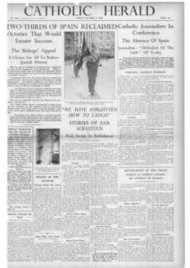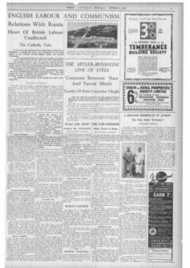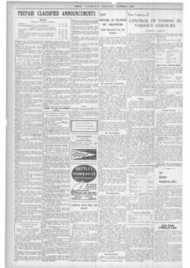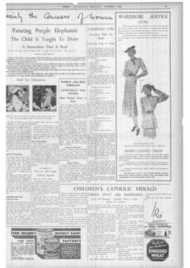Page 10, 2nd October 1936
Page 10

Report an error
Noticed an error on this page?If you've noticed an error in this article please click here to report it.
Tags
Share
Related articles
Leslie Brooks Peeps Over The Battlements
Theatre Mr. Devlin's Lear
All Sorts By
Two Views Of The Conflict In Ireland
Charterhouse Chronicle
IN "THE TIGER" AT THE EMBASSY
Reginald Berkeley's play is all William Devlin. We begin with a raw gawky boy in 1858, tongue-tied, shy, and only bursting into life under the strcss of his father's unjust arrcst by the minions of Napoleon III; we follow the young man through a realistic and determined middle-age, the clarity of his thought and the firmness of his will reducing his friends and opponents to comparative imbecility; we end with an amazing impersonation of Papa Clemenceau in his old age, as known to Englishmen familiar with his photographs in the press.
An actor's tour-de-force, for which one is grateful in these days when characteracting is rare, but only the flimsiest sketch of the personality of the " Tiger."
Clemenceau begins and ends—apart from the miracle of make-up—with that throwing out of the chin, that raising of the head, that fixed burning look which William Devlin implies in the boy, develops in the politician of riper years, and fixedly sets in the old tiger.
Impossible Task
The fact is that the author has attempted too much while being handicapped by the audience's necessary unfamiliarity with the younger Clemenceau surrounded by real persons such as the revolutionary Blanqui, the anarchist Louise Michel, known in her day as the Red Virgin of Montmartre. Zola, Ferre and General Lecomte, and even more handicapped by his being unable or unwilling to bring on to the stage Lloyd George, Foch, Wilson, Edward VII to support the familiar Clemenceau of recent history. The result is that the early scenes give some promise of revealing the character of a real though unknown man, while the later ones are mere and poor excuses to bring on to the stage a familiar figure condemned to do nothing more exciting than 'phone to Lloyd George, converse with dummy generals and liaison officers, and discuss appointments with a pretty private secretary.
The French Radical
In so far as any consecutive line can be drawn from one peak to another of the rough country of sixty years of French history, Clemenceau here represents the realistic radicalism of the third republic.
Introduced as a boy to the Republican Club of Nantes presided over by an laid man who once had known Marat, he is only moved by the reality of his father's unjust arrest. At the age of 22, Doctor Clemenceau cuts through the theorizings of the socialists " according to the gospel of Saint Marx," thinking only of alleviating human misery and scandalizing his friends by declaring that unemployment will not be cured by the revolution but by good government. In the Commune of 1871 he can only think of the evil to everybody of disorder.
Having reached political power in middle age be refuses to sell himself to either the would-be dictators of the Right, Boulanger and Deroulede, both roughly caricatured, or the socialists, represented by Louise Michel, whose personal relations with Clemenceau provide a slight love interest. Meanwhile the fear of Germany and the need for friendship with Britain begin to drive more petty considerations from this realist's mind.
Narrowness of Realism
And so we ieach the war in which Clemenceau's iron determination saves his country from defeat and the peace in which his famous "realism " blinds him to any idea more complicated than the permanent destruction of a larger nation by a weaker one through giving to military victory the status of eternal public law.
In the play the admiring author will not go further than to make the old man drily admit that whatever happens the idealists will succeed in destroying his peace. Whether it was the idealists or -human nature the idealism in which the Tiger could not see is another story. His own idealism comes out in nearly every scene in the form of a good deed of which he is heartily ashamed.
But even so simple an interpretation as this needs a considerable contribution from the historical knowledge of the play-goer. Luckily the earnest audience which frequents the Embassy looks as though it could easily provide what is required. One doubts whether the ladies and gentlemen who can pay for stalls in the West End will find it so easy, and they will be left to admire what, when all is said and done, makes the play, the brilliance of William Devlin.
The Cast
Miss Joan Miller makes an effective young red virgin of Montmartre, but a less
convincing elder virgin. No other member of the large cast gets much of a chance unless it be Mr. Peter Ashmore as Theophile Ferre, one of the leading Communards. One hesitates to say whether it be the part or the players, but it would be hard to find anything less convincing than Deroulede (Mr. Noel Howlett) and
Boulanger (Mr. Raymond Lovell). Miss Elizabeth Western does her best in the absurd part of a private secretary to a Prime Minister who apparently governs his country in exactly the same room and atmosphere as a second-rate lawyer carries on his business from 10 to 4 (week-ends excepted).
M. B.
"Over She Goes
Feeling very depressed I went to see the new musical show Over She Goes at the Saville, in which those two clever comedians, Laddie Cliff and Stanley Lupino appear. In the twinkle of an eye the blues disappeared, and before the final curtain, I realised I had witnessed by far the brightest and the most tuneful show now running in London.
Over She Goes certainly does go over, and the audience was not slow to realise it. Youth and high spirits radiate the whole performance, and laughter greets each number.
Let me just quote a sample of the wit in the shape of a few lines from a foreword enclosed in each programme. It begins:
'Dear Audience (if there). As I am sure you would like to know what the play is about, we shall be most .happy to tell you when we find out. The author went to great pains to write it, and we went to great pains to read it, and the pains are still with us. This is a murder Mystery. The actors will murder the book, the musicians the music. After all as Shakespeare said: 'The play's the thing,' so please excuse this thing, will you? We don't expect you think it as funny as the League of Nations. but we hope you will stand it as long. You will find plenty of parking space outside the theatre for your car; the fine is only f2." And so it goes on . . .
WALTER a BECKETT.
Certainly Sir
It is a tremendous pity that more care has not been taken to provide better material for those two fine comedians, Renee Houston and George Robey, in the new musical comedy Certainly Sir! recently produced at the Hippodrome. Struggle as they did to extract comedy out of their lines, they failed.
Over and over again, George Robey attempted to get intimate with the audience, as only he can, but all in vain.
WALTER a BECKETT.
blog comments powered by Disqus

















